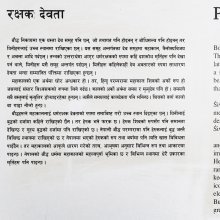Samanata, Samānatā: 7 definitions
Introduction:
Samanata means something in Jainism, Prakrit, Hinduism, Sanskrit. If you want to know the exact meaning, history, etymology or English translation of this term then check out the descriptions on this page. Add your comment or reference to a book if you want to contribute to this summary article.
Images (photo gallery)
In Jainism
General definition (in Jainism)
Source: The University of Sydney: A study of the Twelve ReflectionsSamānatā (समानता) refers to “equivalence” (of pleasure and pain), according to the 11th century Jñānārṇava, a treatise on Jain Yoga in roughly 2200 Sanskrit verses composed by Śubhacandra.—Accordingly, “ [com.—Next he speaks about the equivalence (samānatām) of pleasure and pain (sukhaduḥkhayoḥ)]—Certainly, in this world, in that same house wherein that which is charming is praised in song with joy in the morning, it is lamented with sorrow at midday”.

Jainism is an Indian religion of Dharma whose doctrine revolves around harmlessness (ahimsa) towards every living being. The two major branches (Digambara and Svetambara) of Jainism stimulate self-control (or, shramana, ‘self-reliance’) and spiritual development through a path of peace for the soul to progess to the ultimate goal.
Languages of India and abroad
Sanskrit dictionary
Source: Cologne Digital Sanskrit Dictionaries: Shabda-Sagara Sanskrit-English DictionarySamānatā (समानता).—f.
(-tā) 1. Sameness, equality, likeness. 2. Community of kind or quality. E. samāna, and tal aff.; also with tva aff., samānatvaṃ .
Source: Cologne Digital Sanskrit Dictionaries: Benfey Sanskrit-English DictionarySamānatā (समानता).—[samāna + tā], f. 1. Sameness, equality. 2. Community of kind or quality.
Source: Cologne Digital Sanskrit Dictionaries: Cappeller Sanskrit-English DictionarySamānatā (समानता).—[feminine] likeness, sameness with ([genetive] or —°).
Source: Cologne Digital Sanskrit Dictionaries: Monier-Williams Sanskrit-English Dictionary1) Samānatā (समानता):—[=samāna-tā] [from samāna] f. (na-) equality with ([genitive case] or [compound]), [Śatapatha-brāhmaṇa; Ṛgveda-prātiśākhya; Śiśupāla-vadha] etc.
2) [v.s. ...] community of kind or quality, [Horace H. Wilson]
Source: Cologne Digital Sanskrit Dictionaries: Yates Sanskrit-English DictionarySamānatā (समानता):—(tā) 1. f. Sameness.
[Sanskrit to German]
Sanskrit, also spelled संस्कृतम् (saṃskṛtam), is an ancient language of India commonly seen as the grandmother of the Indo-European language family (even English!). Closely allied with Prakrit and Pali, Sanskrit is more exhaustive in both grammar and terms and has the most extensive collection of literature in the world, greatly surpassing its sister-languages Greek and Latin.
See also (Relevant definitions)
Starts with: Samanatala, Samanatantra, Samanatas.
Ends with: Asamanata, Samadhisamanata.
Full-text: Samadhisamanata, Sukhaduhkha, Venuvana.
Relevant text
Search found 6 books and stories containing Samanata, Samānatā, Samana-ta, Samāna-tā; (plurals include: Samanatas, Samānatās, tas, tās). You can also click to the full overview containing English textual excerpts. Below are direct links for the most relevant articles:
Bhakti-rasamrta-sindhu (by Śrīla Rūpa Gosvāmī)
Verse 3.2.50 < [Part 2 - Affection and Service (dāsya-rasa)]
Maha Prajnaparamita Sastra (by Gelongma Karma Migme Chödrön)
Appendix 4 - Description of Veṇuvana (bamboo park) < [Chapter V - Rājagṛha]
Tattvartha Sutra (with commentary) (by Vijay K. Jain)
Verse 5.35 - Atoms of the the same class (sadṛśa) < [Chapter 5 - The Non-living Substances]
Shishupala-vadha (Study) (by Shila Chakraborty)
Knowledge of the Vedas in the Śiśupālavadha < [Introduction]
Value Education < [October – December, 2006]
The Tattvasangraha [with commentary] (by Ganganatha Jha)
Verse 1764-1775 < [Chapter 20 - Examination of Syādvāda (doctrine)]


